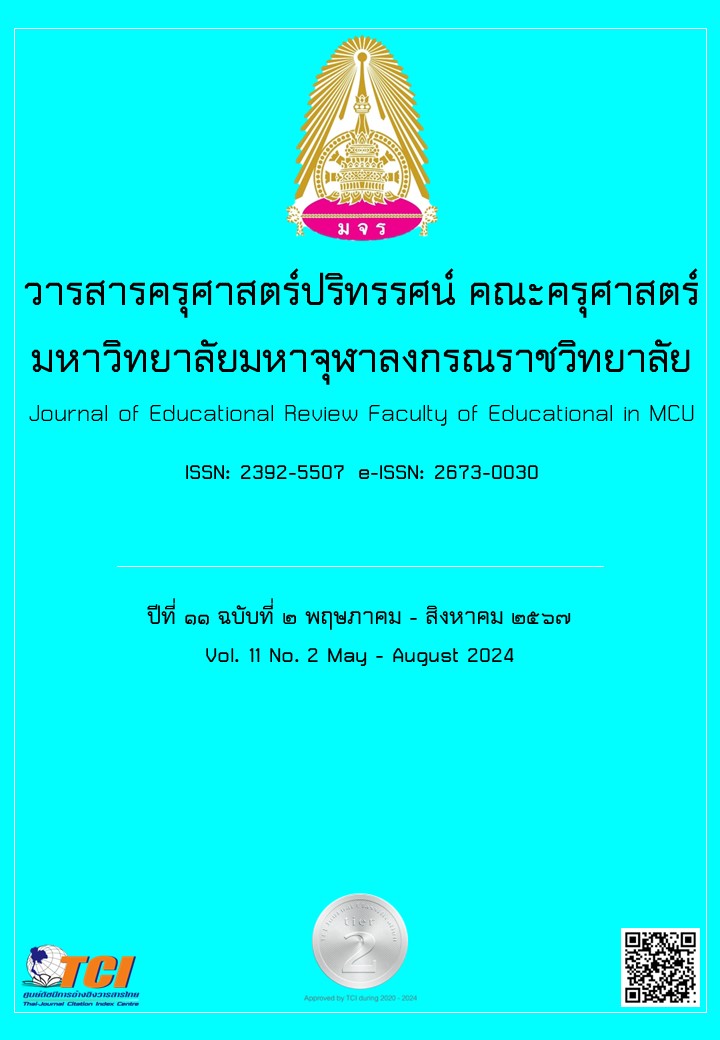DEVELOPMENT GUIDELINES FOR THE PERFORMANCE ACCORDING TO THE PROFESSIONAL CODE OF ETHICS FOR TEACHERS BASED ON TRISIKKHA IN PANTHANAMIT SCHOOLS GROUP, ANGTHONG PROVINCE
Main Article Content
Abstract
This research article aimed to 1) study the status of teachers’ compliance with the teacher’s code of ethics, 2) study the methods of compliance with the teacher’s code of ethics according to the Tri-sikkh principle, and 3) propose guidelines for compliance with the teacher’s code of ethics according to the Tri-sikkh principle. This research was a mixed-methods research. The quantitative research used a questionnaire with the entire population of 97 administrators and teachers. Data were analyzed by finding percentages, means, and standard deviations. The qualitative research used interviews with key informants. Data were analyzed by content analysis. The research results found that 1) The status of compliance with the teacher’s code of ethics of teachers in the Phatthanamit School Group, Ang Thong Province, was at the highest level overall and in each aspect in all 5 aspects. 2) The methods of compliance with the teacher’s code of ethics according to the Tri-sikkh principle of teachers consisted of (1) Ethics towards oneself, continuous self-development, compliance with rules and regulations, and being a good example. (2) Ethics towards the profession, professional development, being a good member of the organization, and networking. (3) Ethics towards service recipients, showing love and kindness, being a good example, and developing students in all aspects. (4) Ethics towards colleagues, creating good relationships, working together, and exchanging knowledge. (5) Ethics towards society, being a good citizen, developing the community, conserving culture, and 3) Guidelines for developing professional ethics for teachers in accordance with the Trisikkh principle of teachers in the Phatthanamit School Group, Ang Thong Province, were as following: (1) Ethics towards oneself: Emphasizing continuous self-development in terms of knowledge, abilities, and ethics in order to be a good role model for students and other personnel. (2) Ethics towards profession: Emphasizing love and faith in the teaching profession, performing duties with honesty and integrity, and being a good member of professional organizations. (3) Ethics towards service recipients: Emphasizing giving importance to all students and service recipients with love, kindness, and full assistance. (4) Ethics towards fellow professionals: Emphasizing building good relationships with fellow teachers and personnel in the school, working together, and exchanging knowledge. (5) Ethics towards society: Emphasizing participation in community development, environmental conservation, and being a good citizen.
Article Details

This work is licensed under a Creative Commons Attribution-NonCommercial-NoDerivatives 4.0 International License.
ทัศนะและความคิดเห็นที่ปรากฏในบทความในวารสารฉบับนี้ถือเป็นความรับผิดชอบของผู้เขียนบทความนั้นเพียงผู้เดียว และไม่ถือเป็นทัศนะและความรับผิดชอบของกองบรรณาธิการ
กองบรรณาธิการขอสงวนสิทธิ์ในการคัดเลือกบทความลงตีพิมพ์และจะแจ้งให้เจ้าของบทความทราบหลังจากผู้ประเมินบทความตรวจอ่านบทความแล้ว
ต้นฉบับที่ได้รับการตีพิมพ์ในวารสารครุศาสตร์ปริทรรศน์ คณะครุศาสตร์ มหาวิทยาลัยมหาจุฬาลงกรณราชวิทยาลัย ถือเป็นกรรมสิทธิ์ของคณะครุศาสตร์ มหาวิทยาลัยมหาจุฬาลงกรณราชวิทยาลัย ห้ามนำข้อความทั้งหมดหรือบางส่วนไปพิมพ์ซ้ำ เว้นเสียแต่ว่าจะได้รับอนุญาตจากมหาวิทยาลัยฯ เป็นลายลักษณ์อักษร
References
ครูเชียงราย. (2566). ความสำคัญของจรรยาบรรณวิชาชีพ. แหล่งที่มา https://www. kruchiangrai.net สืบค้นเมื่อ 3 มิ.ย. 2566.
จารุเนตร เกื้อภักดิ์. (2559). แนวทางพัฒนาศักยภาพบุคลากรสายสนับสนุนของมหาวิทยาลัยเทคโนโลยี ราชมงคลรัตนโกสินทร. วิทยานิพนธ์ศิลปศาสตรมหาบัณฑิต. มหาวิทยาลัยศิลปากร.
พระชลธร อคฺคมฺโม (คงแสง). (2556). การพัฒนาทรัพยากรมนุษย์ตามหลักไตรสิกขาของพระสังฆาธิการ. วิทยานิพนธ์พุทธศาสตรมหาบัณฑิต. มหาวิทยาลัยจุฬาลงกรณราชวิทยาลัย.
พระธรรมปิฎก (ป. อ. ปยุตโต). (2544). พุทธธรรม (ฉบับเดิม). พิมพ์ครั้งที่ 11. กรุงเทพมหานคร: โรงพิมพ์บริษัทสหธรรมิก.
ไพวัลย์ เหล็งสุดใจ. (2558). จรรยาบรรณวิชาชีพผู้บริหาร. วิทยานิพนธ์ครุศาสตรมหาบัณฑิต. มหาวิทยาลัยศิลปากร.
ยนต์ ชุ่มจิต. (2553). ความเป็นครู. กรุงเทพมหานคร: โอเดียน.
รัตนวดี โชติกพนิช. (2550). จริยธรรมและจรรยาบรรณในวิชาชีพครู. กรุงเทพมหานคร: โรงพิมพ์ มหาวิทยาลัยรามคำแหง.
ราตรี พัฒนรังสรรค์. (2544). พฤติกรรมมนุษย์กับการพัฒนาตนเอง. กรุงเทพมหานคร: สถาบันราชภัฎจันทรเกษม.
วิทยาลัยเทคโนโลยีและสหวิทยาการ. (2566). ความสำคัญของจรรยาบรรณวิชาชีพ. แหล่งที่มา https://college.rmutl.ac.th/page/ethics สืบค้นเมื่อ 3 มิ.ย. 2566.
สนทยา ฤทธิ์เดช. (2554). การศึกษาความต้องการในการพัฒนาตนเองของข้าราชการครูในกลุ่มเนินสว่าง จังหวัดพิจิตร. สารนิพนธ์การศึกษามหาบัณฑิต. มหาวิทยาลัยนเรศวร.
สมควร แย้มบุบผา. (2558). การพัฒนาทรัพยากรมนุษย์ตามหลักไตรสิกขาของโรงเรียนอยุธยาวิทยาลัย จังหวัดพระนครศรีอยุธยา. วิทยานิพนธ์รัฐประศาสนศาตรมหาบัณฑิต. มหาวิทยาลัยมหาจุฬาลงกรณราชวิทยาลัย.
สมคิด บางโม. (2553). องค์การและการจัดการ. กรุงเทพมหานคร: วิทยาพัฒน์.
สมาน รังสิโยกฤษฏ์. (2552). ความรู้ทั่วไปเกี่ยวกับการบริหารงานบุคคล. กรุงเทพมหานคร: ประชาชน.
สำนักงานคณะกรรมการการศึกษาแห่งชาติ. (2544). แผนการศึกษาแห่งชาติ (พ.ศ.2545-2559). กรุงเทพมหานคร: พริกหวานกราฟพิค.
สำนักงานคณะกรรมการเศรษฐกิจและสังคมแห่งชาติ. (2559). แผนพัฒนาเศรษฐกิจและสังคมแห่งชาติฉบับที่สิบสอง พ.ศ. 2560-2564. กรุงเทพมหานคร: สำนักงานคณะกรรมการเศรษฐกิจและสังคมแห่งชาติ.
อนันท์ ศรีจันทร์. (2557). แนวทางการพัฒนาครูด้านวิชาการในจังหวัดอุทัยธานี สังกัดสำนักงานเขตพื้นที่ การศึกษามัธยมศึกษา เขต 42. วิทยานิพนธ์ครุศาสตรมหาบัณฑิต. มหาวิทยาลัยราชภัฏนครสวรรค์.
อนุสรณ์ ธูปทอง. (2554). การบริหารทรัพยากรบุคคลตามหลักไตรสิกขาในมณฑลทหาบกที่ 31 จังหวัดนครสวรรค์. วิทยานิพนธ์รัฐประศาสนศาสตรมหาบัณฑิต. มหาวิทยาลัยมหาจุฬาลงกรณราช วิทยาลัย.
อุษา พรหมรินทร์. (2561). การศึกษาการปฏิบัติตามจรรยาบรรณวิชาชีพครูของครูในสถานศึกษาของรัฐ สังกัดสำนักงานเขตพื้นที่การศึกษาประถมศึกษาพระนครศรีอยุธยา เขต 2. วิทยานิพนธ์ศึกษาศาสตรมหาบัณฑิต. มหาวิทยาลัยเทคโนโลยีราชมงคลธัญบุรี.
Wanmainoppakate. เก่งดีมีสุข. แหล่งที่มา https://sites.google.com/site/ wanmainoppakate/keng-di-mi-sukh-1 สืบค้นเมื่อ 7 พ.ค. 2563.
Gillman. (2005). Dissertation. Abstracts International. (43 (5). 1366-A.
Keeves, Peter J. (1988). Model and Model Building: Educational Research Methodology and Measurenment : An Intermational Handbook. Oxford: Pergamon Press.
Krejcie, R. V. & Morgan, D. W. (1970). Determining sample size for research activities. Educational and Psychological Measurement. 30(3). 607–610.
Leonard Nadler. (2002). Designing Training Program. The Critical Event Model. Reading Mass. Addison-Wesley.


